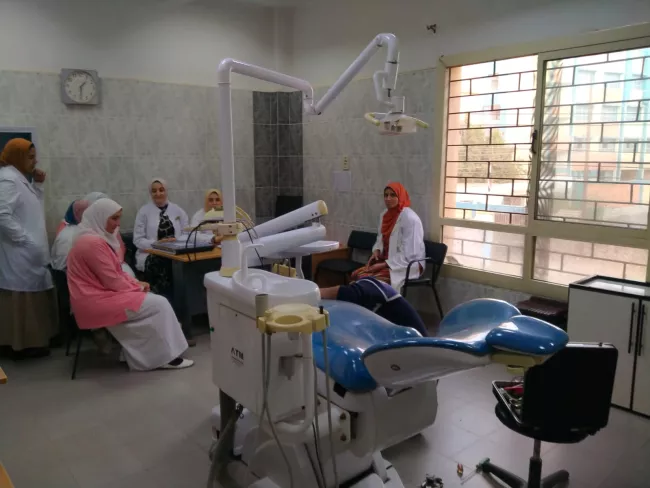
Glut of medical graduates, but no jobs to fill
Mahmoud Saleh, a senior student at the Faculty of Dentistry of Assiut University, has no idea what fate awaits him after graduation later this year. That uncertainty stems from the Ministry of Health’s recent decision to make the placement of medical graduates following their intern year contingent on the ministry’s needs rather than a mandatory process.
Having failed to secure an internship opportunity at a private hospital, Mahmoud currently works at a call center for a telecom company. A job that does not compare to the compulsory government placement that once provided valuable early-career experience in public hospitals and health centers.
As the only son of his father and exempt from military service, Mahmoud will be available for work immediately after graduation. Yet he faces a harsh reality: private clinics are unlikely to hire someone without prior experience, and public hospitals may not accept him either, now that such placements are no longer guaranteed.
Neither can Mahmoud afford to open his own clinic. “The basic setup alone—like a dental chair, tools, and sterilization equipment—costs more than 500,000 pounds ($10,000),” he told Al Manassa. “I tried working in a private clinic, but the pay wasn’t enough to cover my daily expenses.”
He added, “My high school grades weren’t high enough for medicine, so I chose dentistry, thinking it would still lead to a government placement.” But the ministry’s decision has now left Mahmoud and his fellow graduates in most medical sectors in limbo.
Yet more medical faculties
Alongside the suspension of mandatory government placements, which implies an oversupply of graduates, new medical faculties are opening, particularly for dentistry, pharmacy, and physical therapy.
In 2022, the Ministry’s High Placements Committee (takleef) recommended that Minister Dr. Khaled Abdel Ghaffar changes the placement process to needs based. This change, affecting all professions covered by Law 29 of 1974—including doctors, pharmacists, dentists, nurses, health technicians, and auxiliary medical staff—will take effect beginning with the 2025 placement cycle.
Yet, in February, the Supreme Council of Universities approved the establishment of 12 new nonprofit universities set to open in October. These include six dentistry schools in Cairo, Tanta, Fayoum, Ain Shams, Suez, and Kafr El-Sheikh; seven pharmacy schools in Sadat City, Tanta, New Valley, Damanhour, Sohag, Kafr El-Sheikh, and Cairo; three physical therapy schools in Cairo, Kafr El-Sheikh, and Suez; and five veterinary medicine schools.
Amid growing concerns from conflicting policies—reducing placements while opening new medical schools—professional syndicates have begun advocating for what they call their members’ rights, aiming to secure employment opportunities both domestically and abroad.
Head of the Egyptian Dental Syndicate, Ehab Heikal, coordinated with the dental sector committee of the Supreme Council of Universities to propose adding forensic dentistry to postgraduate programs, aiming to open new career paths for dental graduates.
Heikal told Al Manassa that the committee has approved the proposal. “The program will begin as a diploma in forensic dentistry, with plans to develop a full master’s and doctoral track later,” he said. “This will help graduates find work abroad.” He added that the program will be launched in several universities next year, and the syndicate has offered to help develop the curriculum.
A warning
Beyond expanding specialization options, the syndicate also officially warned the government. In a letter sent to the Ministry of Higher Education seen by Al Manassa, the syndicate warned against opening new medical schools, noting that Egypt already has 81.
The letter pointed out that the United States has 65 dental schools that provide about 6,500 graduates annually. In contrast, Egypt’s 2023 dental class was approximately 12,000, with the 2024 class expected to reach 13,000.
According to statistics provided by the syndicate to the Ministry in 2022, there were about 81,000 dentists in Egypt in 2022, with 69,000 students enrolled in dental schools. Today, there are roughly 108,000 dentists, 70,000 students, and about 7,000 Egyptians studying dentistry abroad.
“We’ve exceeded global ratios and are approaching a phase of unemployment in this critical medical field,” warned syndicate sec-general Hussein Abdel Hadi, who told Al Manassa that the job market cannot absorb this volume.
Abdel Hadi argued that the government’s projections justifying new school openings are inaccurate. He noted that only about 15% of dentists hold master’s or doctoral degrees, which severely limits the number of qualified faculty needed to staff new schools.
Heikal agrees, saying the dental sector suffers from a severe shortage of faculty members. He called the number of graduates “alarming” and framed the issue as one of national security due to the resulting unemployment.
“We’ve proposed multiple times that dental schools limit their annual intake to no more than 8,000 students,” Heikal added. “But our recommendations have been ignored.”
A feasibility study
In an effort to accommodate the swelling numbers, representatives from the syndicate met with the director-general of dental affairs at the Ministry of Health and officials from the public placements department. The syndicate presented a detailed feasibility study for a project to increase the number of dental clinics under the ministry, beginning with the classes of 2023 and 2024.
According to the study, seen by Al Manassa, the goal is to hire 62,000 dentists over five years and to provide one dental chair for every 2,000 citizens inside Egypt. This expansion would generate a demand for new dentists and contribute to the Health Ministry’s public revenue.
To serve Egypt’s 125 million residents, including 10 million non-citizens, the country would need approximately 62,500 chairs. However, the ministry currently has only about 6,000. The study proposes acquiring the remaining 56,500 chairs in 11 phases over 11 years—installing 5,000 annually—at a cost of 11.3 billion pounds.
Each chair is estimated to cost 200,000 pounds. The study projects that each chair could generate around 380,000 pounds per year. Based on these calculations, the total projected revenue for the first phase (6000 + 5000 chairs) is 4.125 billion pounds, with annual revenues reaching up to 22.95 billion once the project is completed.
Relying on the syndicate’s data, Abdel Hadi warned of a bloated pool of general practitioners. He attributed the government’s continued production of new graduates to its desire to export them. “There’s demand for Egyptian dentists in Gulf countries and Europe,” he said.
Prime Minister Mostafa Madbouly had previously dismissed claims of a brain drain, stating, “If 7,000 or 8,000 doctors leave, it won’t be a problem.” But Abdel Hadi challenges this logic, calling it misguided and based on unrealistic assumptions.
He explained that “foreign markets today don’t accept Egyptian GPs, especially with the rise of localization policies like Saudization in Saudi Arabia. These markets are only looking for specialists or consultants.”
Pharmacists' silence
Meanwhile, the pharmacy sector has remained largely silent. The Egyptian Pharmacists Syndicate has not taken any action in response to the government’s decision to open new pharmacy schools while abandoning the mandatory placement system.
Pharmacists have been left more vulnerable by the absence of union leadership, as the syndicate currently lacks an executive council. A temporary committee headed by Karim Badr, sec-gen of Parliament’s Health Committee, is managing its affairs. Badr told Al Manassa that the syndicate rejects any decision to increase the number of pharmacy grads without providing real job opportunities.
“We’ve held multiple discussions with the Ministry of Health regarding the unresolved placements for the 2018, 2019, and 2020 cohorts,” he said. “We won’t let our members be victims of poor policymaking.”
Nagwa Hashem, head of the Giza branch of the Pharmacists Syndicate, also opposes new pharmacy schools and describes the expansion over recent years as haphazard, resulting in an oversupply.
Hashem told Al Manassa that the current push to open new pharmacy schools in private and nonprofit universities—despite students paying up to 100,000 pounds annually in tuition—reflects misguided policy. “It’s become a business,” she said, calling on the Ministry of Health to reinstate the placement system. She also rejected the justification that high graduate numbers make it impossible, noting that pharmaceuticals and research centers have not hired in years, so it is about time.
Catastrophic impact on physiotherapy
The situation is equally dire in the field of physiotherapy, where there are now more than 70 schools across public, nonprofit, and private universities. Sami Saad, head of the Physiotherapy Syndicate, called the end of mandatory placements “a worthless indulgence.”
Saad told Al Manassa that the syndicate had submitted a labor market analysis to the physiotherapy sector committee of the Supreme Council of Universities. Based on this report, a decision was made to stop licensing new schools. But that decision was suspended.
“This will have catastrophic consequences,” Saad said. “The market is flooded with grads, and there are no jobs.”
He also pointed to the declining educational standards, which he said affects the quality of graduates. “If the state wants to invest in this sector, it should upgrade existing faculties and improve faculty training,” he added.
Saad had invited the medical, dental, pharmaceutical, and nursing syndicates to a meeting to discuss escalating the response to the government’s policies, but the invitation received little response.
Egypt’s medical sector continues to suffer from an exodus of professionals in search of better-paying job opportunities.
“This trend poses a serious threat,” Osama Abdel Hay, head of the Doctors Syndicate, warned. He said that in 2023, about 7,000 doctors emigrated—more than double the 3,000 who left in 2021 and 2022.
Abdel Hay told Al Manassa that low pay is a major factor, but not the only one. “Doctors are also seeking safe work environments, quality training and education, less working hours, proper housing, and respectful treatment in ER,” he said.
These are the same reasons Mahmoud is considering leaving. “As soon as I graduate, I’ll relocate,” he said. “There’s no other option.”
